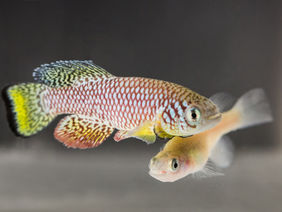The immune system constantly responds to new attacks from pathogens and remembers them in order to be prepared for the next infection. For this purpose, B cells build an information repository and produce a variety of antibodies that can directly recognize the pathogens.
"We wanted to know about the antibody repertoire in old age," explains Dario Riccardo Valenzano, who led the study. "It is difficult to study a human being's immune system over his or her entire life, because humans live a very long time. Moreover, in humans you can only study the antibodies in peripheral blood, as it is problematic to get samples from other tissues. For this reason, we used the killifish. It is very short-lived and we can get probes from different tissues." Indeed, Valenzano and his team found that old killifish have less diverse circulating antibodies as compared to younger fish. This may contribute to a generalized decrease in the immune function.
Killifish age as if in time-lapse
Killifishes (Nothobranchius furzeri) are the shortest-lived vertebrates that can be kept in the laboratory. They live for only three to four months, they age as if in time-lapse and have become the focus of aging research in recent years due to these characteristics.
The research for this study was conducted at the Max Planck Institute for Biology of Ageing and was funded by the CECAD Cluster of Excellence for Aging Research and the Collaborative Research Center 1310 at the University of Cologne. The results were published in the journal .
(Source: )
Valenzano heads research group at FLI since Juli 2021
Since July 2021, Dario Riccardo Valenzano has been conducting research at Leibniz Institute on Aging - Fritz Lipmann Institute (FLI) in Jena, where he heads the research group "Evolutionary Biology / Microbiome-Host Interactions in Aging". At FLI the killifish has been used as a model for aging research since 2005. In 2015, a research team decoded the genome of the fish and identified genes relevant to the aging process. The genome data are publicly available in the FLI database and are used by aging researchers worldwide.









